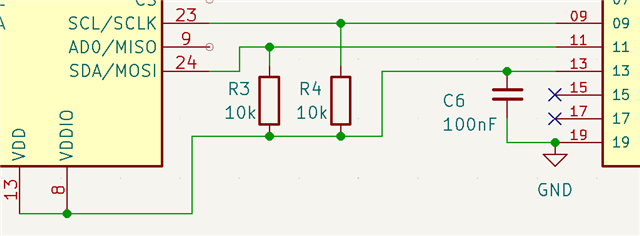Hi,
I have builded a circuit with a nRF52DK and a mpu9250 IMU. If I power the Sensor with VDD the Zephyr driver and all of the Software performs well and the values from the IMU are displayed correctly in my console.
Now I have Problems with powering the mpu sensor through the nRF's GPIOs. My first attempt is to set the GPIO_0 to HIGH and bind the mpu with a little delay. I think i had tenable and disable some driver for the TWI bus, but until now I have not found the right way. Maybe you can give me some advise.
nrf Connect SDK 1.9.1 - VSCode
const struct device *gpio_dev1;
gpio_dev1 = device_get_binding("GPIO_0");
if (!gpio_dev1) {
printk("Cannot find %s!\n", "GPIO_0");
return;
}
ret = gpio_pin_configure(gpio_dev1, VDD_PIN1, GPIO_OUTPUT_ACTIVE);
if (ret < 0) {
return;
}
gpio_pin_set(gpio_dev1, VDD_PIN1, 1);
NRFX_DELAY_US(MEASURE_INTERVAL*1000); // 2 Seconds
const char *const label = DT_LABEL(DT_INST(0, DEVICE_NAME_IMU)); //DEVICE_NAME_IMU = invensense_mpu9250
const struct device *mpu9250 = device_get_binding(label);
if (!mpu9250) {
printf("Failed to find sensor %s\n", label);
//return;
}else{
printk("Sensor connected: %s\n", label);
}
Console Output:
[00:00:02.048,858] <inf> sdc_hci_driver: SoftDevice Controller build revision:
0e e7 c5 66 67 18 3c ac b3 d2 cc 81 a3 dc f1 c0 |...fg.<. ........
c0 36 02 22 |.6."
[00:00:02.051,208] <inf> bt_hci_core: HW Platform: Nordic Semiconductor (0x0002)
[00:00:02.051,208] <inf> bt_hci_core: HW Variant: nRF52x (0x0002)
[00:00:02.051,208] <inf> bt_hci_core: Firmware: Standard Bluetooth controller (0x00) Version 14.50663 Build 1008232294
[00:00:02.052,124] <inf> bt_hci_core: Identity: EF:F0:9B:1E:C2:0B (random)
[00:00:02.052,154] <inf> bt_hci_core: HCI: version 5.2 (0x0b) revision 0x12fe, manufacturer 0x0059
[00:00:02.052,154] <inf> bt_hci_core: LMP: version 5.2 (0x0b) subver 0x12fe
[00:00:02.092,163] <err> i2c_nrfx_twi: Error 0x0BAE0001 occurred for message 0
[00:00:02.092,163] <err> MPU9250: Failed to read data sample.
[0:00:04.102]:2942.578125 mV
[0:00:04.117]:23.3 Cel
[0:00:04.131]:1003 hPa
sample fetch/get failed: -5
[0:00:04.136]:0 minutes
----------------------------------
(P.S.: After powering up the MPU with VDD and then switch the power source of the MPU&I2C Bus to the GPIO it works correctly - so it should not be to less power)



